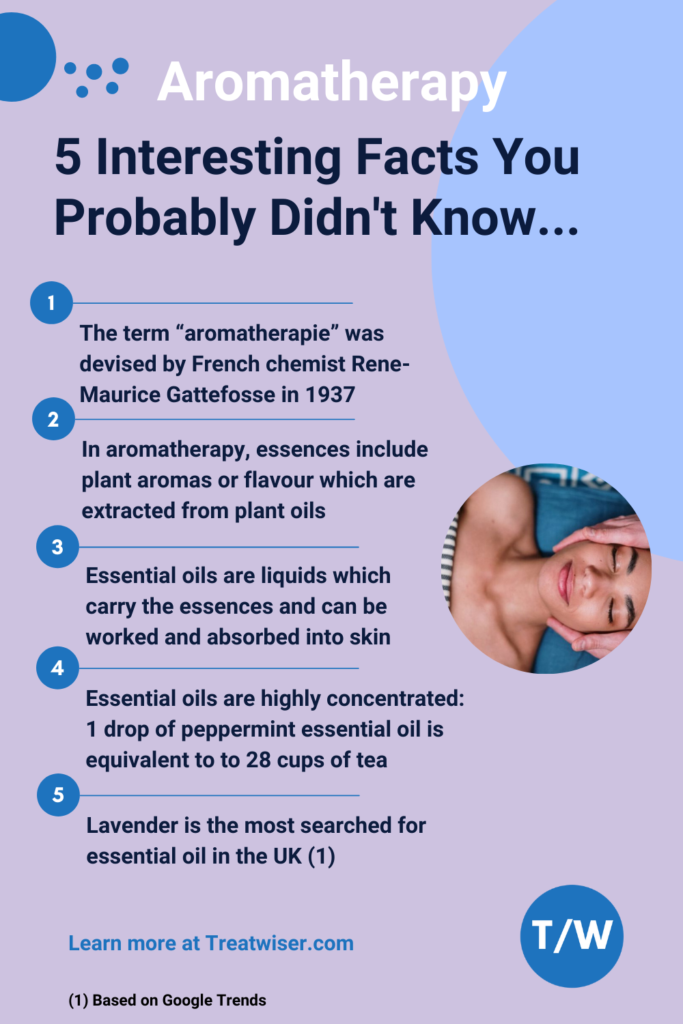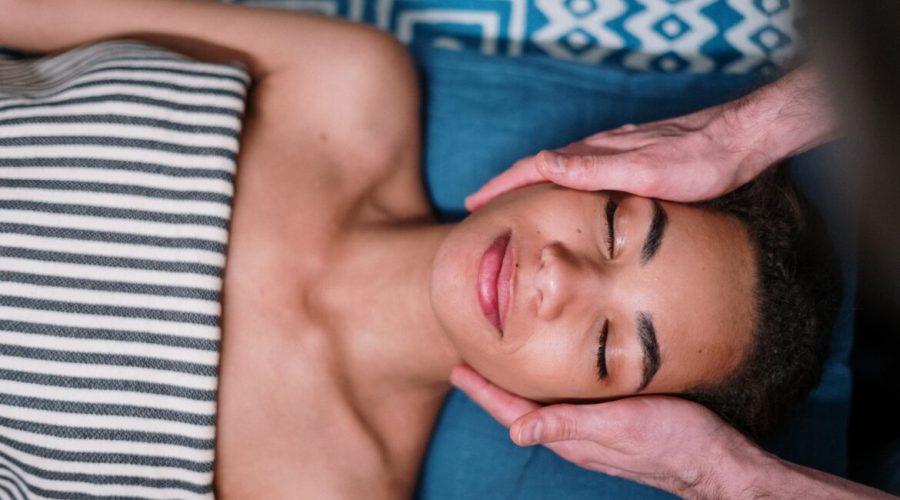Aromatherapy treatment is a complementary therapy that uses aromatic essentials oils extracted from plants and flowers.
In modern aromatherapy essential oils are used therapeutically to promote wellbeing for mind, body and soul. Over recent years, aromatherapy has been gaining significant ground as a form of holistic health support, becoming one of the most popular in Europe and the USA.
This page will explore the background of aromatherapy, how it works as well as how to start your aromatherapy journey.
Table of contents
- 5 interesting facts about aromatherapy
- What is aromatherapy?
- What is the theory behind aromatherapy?
- When and how is aromatherapy used?
- What is the evidence to support aromatherapy?
- What can I expect as an aromatherapy patient?
5 interesting facts about aromatherapy

What is aromatherapy?
Aromatherapy treatment uses essentials oils from plants to support the body, which some believe can promote physical, spiritual and emotional health and wellbeing
Fragrant oils, herbs and flowers have been used for thousands of years. The ancient Egyptians used aromatic oils in their healing ointments and the ancient Romans used them in their Roman baths and in the production of perfumes and wine.
The term “aromatherapie” was devised by the French chemist Rene-Maurice Gattefosse in 1937. Gattefosse severely burned his hand in a laboratory explosion whilst working in his family’s perfume factory. He immediately immersed his hand in a container of pure lavender oil and was impressed by its regenerative properties as his skin quickly healed. So impressed was he that he started researching the healing powers of other essential oils, and in doing so started the modern day science of aromatherapy.
Modern aromatherapy treatment as we see it today was popularised by Dr. Marguerite Maury, an Austrian biochemist who conducted extensive research into healing and rejuvenation properties of essential oils from plants including their medical properties when absorbed through the skin. Dr. Maury opened aromatherapy clinics which promoted massage with essential oils to support a range of conditions including mental health issues.
Many aromatherapists have since followed her lead, making it one of the most popular forms of holistic therapy today.
What is the theory behind aromatherapy treatment?
Volatile aromatic compounds of plant oils are extracted to create essence
In aromatherapy, essence is taken from the volatile compounds of plant oils found in leaves, flowers, bark, wood, seeds, stems, roots and citrus fruit peel.
The essence includes a plants aroma or flavour, and the essential oil is the liquid that carries this. It is extremely concentrated once it’s gone through the extraction process. Puttig that into perspective, 1 drop of peppermint essential oil is the equivalent to 28 cups of tea!
There are several ways in which these volatile compounds are extracted. The best ways for therapeutic purpose include steam distillation, and cold-pressing for citrus fruit peel.
Other methods using solvents, known as absolutes or resins are best suited for the perfume industry where aroma is the main importance whether that is synthetic or natural.
The benefits of aromatherapy can be obtained through inhalation, external and internal applications
There are three key ways in which the benefits of essential oils can be applied, they are:
- Inhalation – essential oils enter the body through the nose, aromatic molecules trigger a response in the brain through the limbic system. The molecules also enter the bloodstream through the lungs, with impact on the body, a body system, organ or an emotional state being “targeted”
- External application – when applied directly to the skin there are localised effects for that specific area, also there are body system effects as essential oils are absorbed through the skin with the molecules targeting specific systems and organs helping the body to function normally and contribute to general wellbeing i.e. supporting the immune system
- Internal application – essentials oils are ingested in order for them to reach specific parts of the body or to affect body systems such as supporting gastrointestinal health, or internal cleansing benefits, as well as being natural, potent flavours for beverages and food (this is not fully accepted by all)
The potential benefits of aromatherapy including aromatherapy massage benefits can be broken down into psychological and physical components:
Psychological benefits
- Improves mood including through physical contact of external application
- Enhances relaxation improving overall sense of wellbeing
- Eases sad and anxious feelings
Physical benefits
- Maintains feelings of easy breathing and clear airways
- Improves circulation throughout the body
- Supports a healthy immune function
- Relieves muscle tension increasing relaxation. Helps restore mental alertness or wakefulness when experiencing fatigue or drowsiness.
When and how is aromatherapy applied?
Patients seek aromatherapy for a range of reasons
In addition to using aromatherapy treatment for sleep and relaxation, the therapeutic properties of essential oils are believed to support the immune system, reduce stress and contribute to general wellbeing. There are various conditions that aromatherapy is thought to be able to help with including:
- Bacterial and viral infections
- Herpes
- Shingles
- Skin conditions such as acne
- Skin rejuvenation
- Muscular disorders
- Arthritis
- Stress and anxiety
- Insomnia
- Dementia
- Chronic pain
- Cancer
- Palliative care
Aromatherapy treatment uses a range of treatments and techniques
The key treatments and techniques include:
Inhalation
- Diffusers which disperse small particles of essential oil into the surrounding air support the respiratory system or simply improve mood
- Steam tent where an essential oil such as rosemary oil or lavender oil is added to a pot of steaming hot water and a towel is used to tent your head at a safe distance
- Nose cone where essential oil is placed on napkin or tissue and placed in either nostril
- Floral waters which spray mixture of essential oils and distilled water around the room or directly onto the body to refresh and relax
External application
- Massages where essential oils blended with carrier oils are worked and absorbed into skin to stimulate or relax the patient
- Hot baths with essential oils particularly soothe emotional and physical wellbeing
- Compresses are applied to ease aches and pains as well as swelling and sprains
Internal application
- Ingestion involving swallowing essentials oils in veggie capsules and mixed into cooking and beverages to support gastrointestinal health, or offer internal cleansing benefits, this is also a way to add natural potent flavours to our food (this is not fully accepted by all)
Massage is the most commonly used aromatherapy treatment
Aromatherapy massages use various techniques to work the oil into the skin. Depending on the precise technique and oil used, the massage has potential to either stimulate or relax the patient.
Massage oil blends need to be diluted by mixing with a carrier oil such as fractionated coconut oil, sweet almond or avocado oil. Once the massage is finished, the absorption rate of essential oil can be increased by wrapping up in a warm blanket or towel.
What is the evidence to support aromatherapy treatment?
So how effective is aromatherapy? Research is ongoing into the healing abilities of essential oils extracted from plants. There are so many studies to list where it is demonstrated that aromatherapy might be effective, including for:
- Anxiety and depression relief (1)
- Improved quality of life for people with underlying health conditions including dementia (1)
- Improved ability to sleep (1)
- Improved pain relief for people with kidney stones (1)
Should the topic pique your interest, there is much research into essential oils recorded on the PubMed website.
What can I expect as an aromatherapy patient?
The aromatherapy treatment consultation
The first aromatherapy session which typically lasts up to one hour is where the aromatherapist will try to understand more behind your reasons and motivations for seeking treatment. He or she may discuss your health history in some detail to build up a full profile of your health and lifestyle.
Once a full profile has been created, a certified clinical aromatherapist will propose a bespoke treatment plan that should be most appropriate for you. The treatment plan is likely to include a mixture of at-home treatments and aromatherapy massage sessions.
The aromatherapist will share the relevant aromatherapy oils and their properties so that you can have a say in selecting ones which are most suitable for your needs.

How do I find an aromatherapist and what qualifications should they have?
There are no legal requirements stipulating the level of training or specific qualifications required for an aromatherapist to practice, but they must be insured to practice professionally.
Although many aromatherapy practitioners are likely to have a high level of experience and knowledge on massage for aromatherapy, essential oils and physiology, it is recommended that you choose a registered aromatherapist who is a member of one of the voluntary professional bodies that regulate the industry. These bodies will require its members to have completed specific aromatherapy courses and adhere to a strict code of ethics.
Voluntary professional bodies covering the UK include:
- International Federation of Aromatherapists
- The International Federation of Professional Aromatherapists
- Federation of Holistic Therapists
- Complementary and Natural Healthcare Council
You may find it useful to seek recommendations from doctors and other people who can help.
You can also use Treatwiser’s directory to find an aromatherapist near me. Use the search features to narrow your search by location, professional body membership status, and more.
How much will it cost?
Patients will need to pay for aromatherapy treatments themselves as it is not covered under health insurance or the NHS. The cost will depend largely on the treatments that you have.
The price of a consultation typically varies between £25 and £75. Extra costs may also be applicable for at-home treatments.
It is important that you receive full visibility on treatment costs before agreeing to commence. You may also want to speak to your GP to ensure that the treatment is safe for your circumstances.
How many appointments will I need?
The aromatherapist will offer a highly personalised treatment plan which will likely be a mixture of at-home treatments and in-person treatments such as massages.
A full treatment plan may include up to around 10 sessions, however it is usual to only require one depending on your individual situation.
Are all essential oils equal?
Whether for professional or home aromatherapy use, essential oils of the highest quality should be used.
The term ‘pure and natural’ is used by many suppliers and indicates there are no synthetic materials added. However, many essential oils are adulterated with added fillers which may be acceptable for the purpose of fragrances (although we are still going to be breathing in those chemicals), but not for using on the body where oils are absorbed through the skin.
Typically speaking, if you pay very little for a ‘pure’ essential oil, then the quality will be low and most likely synthetic or adulterated. A lot of work goes into producing essential oils and ‘cheap’ essential oils do not reflect a true pure essential oil, plus the results and impact will be different too.
Personally speaking, synthetic oils make me sneeze, and sometimes wheeze, so these oils would not be suitable for any kind of aromatherapy treatment. If I didn’t understand the difference, I could be misled into thinking essential oils are not good to use because of my physical reaction.
When you compare the aroma of pure and synthetic essential oils, the difference is instantly noticeable – the nose knows, you just can’t hide it!
Finding a reputable essential oil supplier is so important, here’s a few factors to consider:
- quality – only use 100% pure, natural and authentic essential oils for therapeutic use
- how is the quality guaranteed, are the gas chromatography results available? (adulteration is easily detectable by this testing method that confirms the chemistry/contents of the oil)
- co-impact sourcing – how are the growers treated, are there ethical fair-trade agreements in place (growers have been unfairly treated and taken for granted for years)
- research – do they share research into their essential oils with evidence to show efficacy?
What are the major risks associated with aromatherapy treatments?
When truly pure oils are used correctly, essential oils are generally safe to use. That said, they may be unsafe when ingested or massaged onto damaged skin or wounds.
When inhaled or massaged, there is a risk of side effects including irritated skin or allergic reactions. It is important to let your aromatherapist know if you suffer from any allergies or have sensitive skin so the appropriate precautions can be made.
If you experience irritation or allergic reactions, apply a carrier oil (sweet almond, coconut, olive oil etc.) to the area of contact, do not use water as this will push the essential oils further into the skin. Get in touch with your GP or doctor if reaction remains the same or worsens.
It is advised seeking medical advice from your doctor before trying aromatherapy – especially if you are elderly, pregnant, asthmatic, suffer from respiratory disease or using prescribed medication as there is a risk that the essential oils may interfere.
Resources and further aromatherapy treatment information
DISCLAIMER: The Site cannot and does not contain medical / health advice. The medical / health information is provided for general informational and educational purposes only and is not a substitute for professional advice. Accordingly, before seeking any form of medical advice, diagnoses or treatment based upon such information, we encourage you to consult with your GP or other qualified health practitioner. You must never disregard professional medical advice or delay in seeking it because of something mentioned on this Site. The use or reliance of any information contained on the site is solely at your own risk.





